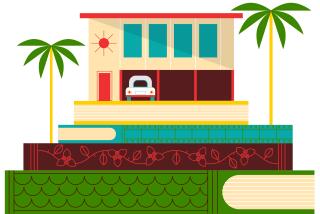FICTION
- Share via
THE JUNK-DRAWER CORNER-STORE FRONT-PORCH BLUES by John R. Powers (Dutton: $19; 224 pp.) . If Slats Grobnik, the character in Mike Royko’s newspaper columns who personifies Chicago’s down-home, blue-collar virtues, ever wrote a novel, it might be this one. Except that who can imagine Slats becoming a comedy writer in Hollywood?
That’s the trouble with this story, which amounts to a convincing portrait in an unconvincing frame. Twenty years after leaving Chicago, Donald Cooper is leading a life of stereotypical Southern California anomie, compulsively jotting down wisecracks in a spiral notebook, unable to commit to his girlfriend, accept his son’s acting career or otherwise grow up.
Why? Because Donald’s humanly and athletically gifted younger brother, Danny, died at 18, leaving him stranded. That is, until a cancer scare and an urgent request from his mother send Donald back to the old neighborhood and into the house he swore he’d never enter again.
A clumsy plot device--the search for a box of memorabilia--stretches out the framing story while the real story, the story of Donald’s boyhood with Danny in the true, gritty, no-nonsense ambience of the South Side, gets going. Then author John R. Powers’ love for the place and the people sweeps us along. Even here, though, he’s handicapped by Donald’s smart-aleck, staccato voice, which is incapable of lyricism. Remember how Philip Roth, between sex scenes in “Portnoy’s Complaint,” describes those softball games among middle-aged New Yorkers with such aching nostalgia? “Blues,” to be the blues, needs a little of that.
More to Read
Sign up for our Book Club newsletter
Get the latest news, events and more from the Los Angeles Times Book Club, and help us get L.A. reading and talking.
You may occasionally receive promotional content from the Los Angeles Times.










